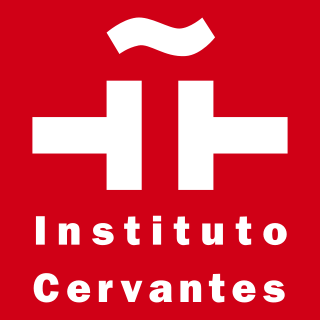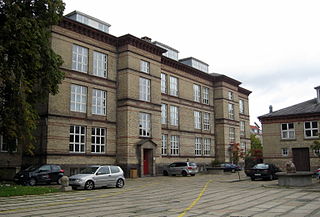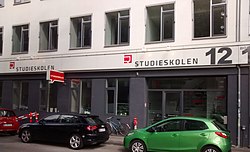The Leaving Certificate Examination, commonly referred to as the Leaving Cert or (informally) the Leaving, is the final exam of the Irish secondary school system and the university matriculation examination in Ireland. It takes a minimum of two years' preparation, but an optional Transition Year means that for those students it takes place three years after the Junior Cycle examination. These years are referred to collectively as "The Senior Cycle". Most students taking the examination are aged 16–19; in excess of eighty percent of this group undertake the exam. The Examination is overseen by the State Examinations Commission. The Leaving Certificate Examinations are taken annually by approximately 60,000 students.

Aarhus University is a public research university with its main campus located in Aarhus, Denmark. It is the second largest and second oldest university in Denmark. The university is part of the Coimbra Group, the Guild, and Utrecht Network of European universities and is a member of the European University Association.
In the Scottish secondary education system, the Higher is one of the national school-leaving certificate exams and university entrance qualifications of the Scottish Qualifications Certificate (SQC) offered by the Scottish Qualifications Authority. It superseded the old Higher Grade on the Scottish Certificate of Education (SCE). Both are normally referred to simply as "Highers".

Łódź University of Technology was created in 1945 and has developed into one of the biggest technical universities in Poland. Originally located in an old factory building, today it covers nearly 200,000 sq. meters in over 70 separate buildings, the majority of which are situated in the main University area. Almost 15,000 students are currently studying at the university. The educational and scientific tasks of the university are carried out by about 3,000 staff members.

Hankuk University of Foreign Studies is a private research university based in Seoul, in South Korea. The university currently teaches 45 foreign languages. In addition, it contains studies in humanities, law, political science, social sciences, business, medical science, natural sciences, and engineering.
Education in Vietnam is a state-run system of public and private education run by the Ministry of Education and Training. It is divided into five levels: preschool, primary school, secondary school, high school, and higher education. Formal education consists of twelve years of basic education. Basic education consists of five years of primary education, four years of secondary education, and three years of high school education. The majority of basic education students are enrolled on a daily basis. The main goals are general knowledge improvement, human resources training and talent development.
Cambridge Assessment English or Cambridge English develops and produces Cambridge English Qualifications and the International English Language Testing System (IELTS). The organisation contributed to the development of the Common European Framework of Reference for Languages (CEFR), the standard used around the world to benchmark language skills, and its qualifications and tests are aligned with CEFR levels.

Instituto Cervantes is a worldwide nonprofit organization created by the Spanish government in 1991. It is named after Miguel de Cervantes (1547–1616), the author of Don Quixote and perhaps the most important figure in the history of Spanish literature. The Cervantes Institute is the largest organization in the world responsible for promoting the study and the teaching of Spanish language and culture.
DELTA is an English language teaching (ELT) qualification for experienced Teachers of English as a Foreign Language (TEFL) and Teachers of English to Speakers of Other Languages (TESOL). It is provided by Cambridge English Language Assessment through authorised Cambridge English Teaching Qualification centres and can be taken either full-time or part-time. The full name of the course was originally the Diploma in English Language Teaching to Adults and is still referred to in this way by some course providers. However, in 2011 the qualification title was amended on the Ofqual register to the Cambridge English Level 7 Diploma In Teaching English to Speakers of Other Languages (DELTA) in order to reflect that the wider range of students that teachers might have, including younger learners.

The University of Medicine 2, Yangon is a university of medicine, located in North Okkalapa, Yangon, Myanmar. The university offers M.B., B.S. degrees and graduate degrees in medical science. The university is one of the most selective in the country, and accepts approximately 300 students annually based solely on their University Entrance Examination scores.
Trinity College London, established in 1872, is a leading international exam board, publisher and independent education charity. Since 1938 Trinity has been offering English language assessments taken by over 850,000 candidates in over 60 countries each year.

The Cours de Civilisation Française de la Sorbonne is a private French civilisation and French language institution based in Paris since 1919 and was created as a French foreign language school, or français langue étrangère (FLE).

The International Requirements Engineering Board (IREB) e.V. was founded in Fürth in Germany in October 2006. IREB e.V. is as a legal entity based in Germany.
Phaungdawoo Monastic Education Affiliated High School or Phaung Daw Oo Monastic School is a high school of Theravada Buddhist monastic education located in Aungmyethazan Township, Mandalay, Myanmar.
The Iran Language Institute, abbreviated as ILI is a state-owned, non-profit organization founded in 1979 in Iran with the national mission of developing foreign language learning. It is a subsidiary of Institute for the Intellectual Development. The headquarters of this institute is located in the country's capital, Tehran. The ILI, currently having around 200 centers in 73 cities, offers language courses in Persian, English, French, German, Russian, Spanish and Arabic to around 240,000 learners.
The European Language Certificates are international standardised tests of ten languages.
The Institute of Modern Languages, also known as IML-UQ, is a language and translation institute located within the St Lucia campus of the University of Queensland (UQ) in Brisbane, Australia. Today IML-UQ enrolls 3000 plus students annually in all of its language programs.

The Danish Voksenuddannelsescentre is the general adult education programme which is part of the public education system in Denmark. There are 29 adult education centres (VUCs) in Denmark.
Teaching English as a second (TESL) orforeign language (TEFL) and teaching English to speakers of other languages (TESOL) are terms that refer to teaching English to students whose first language is not English. The terms TEFL, TESL, and TESOL distinguish between a class's location and student population, and have become problematic due to their lack of clarity. TEFL refers to English-language programs conducted in countries where English is not the primary language, and may be taught at a language school or by a tutor. For some jobs, the minimum TEFL requirement is a 100-hour course; the 120-hour course is recommended, however, since it may lead to higher-paid teaching positions. TEFL teachers may be native or non-native speakers of English.









